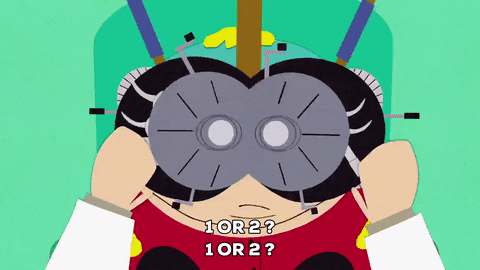

Is your vision blurry lately? You may have astigmatism. It’s a common eye problem that causes your eyesight to be distorted. Corrective lenses or surgery can fix it. The only way to diagnose astigmatism is to consult an eye doctor, but our quiz can help you make sense of your symptoms.
Do you have astigmatism? This astigmatism test will reveal the probability of that kind of diagnosis. Don’t worry – we won’t make you read tiny letters from the board!
Let’s see how sharp your eyesight is!
Astigmatism is not a disease or a disorder. It’s a type of imperfection or error in an eye’s curve. The cornea of your eye and the lens behind it should curve like a round ball. In astigmatism, it is oval- or egg-shaped. It causes the light to bend in a different way as it enters the eye, which results in blurry vision.
There are two types of astigmatism. Horizontal astigmatism occurs when the eye is wider than tall, whereas vertical astigmatism occurs when the eye is taller than wide.
Astigmatism is usually present at birth. Specialists don’t know what causes it, but they believe genetics is a crucial factor. Astigmatism can be passed down from parent to child. Sometimes it can develop due to an eye injury or after surgery. In rare cases, a disease called keratoconus causes astigmatism by affecting the cornea, leading to blurry vision and light sensitivity.
Do you think you could be colorblind?
The most common signs of astigmatism include:
With mild astigmatism, you might not notice any symptoms. That is why it is critical to have regular eye exams — your optometrist can help you ensure that you are seeing as clearly as possible. It is relevant to children in particular because they may be unaware that they have blurry vision.
Who’s at risk for astigmatism? Risk factors for developing astigmatism include:
This is an exciting way to see if you are colorblind!
Astigmatism is corrected thanks to eyeglasses or contact lenses. A doctor will prescribe the appropriate corrective lenses to help you see more clearly. It is a minimally invasive treatment option. There are toric soft lenses and RGP lenses, and the latter is more effective for severe astigmatism.
In severe cases, doctors will use surgery to treat astigmatism. Astigmatism surgery options include LASIK, where the surgeon cuts a flap in the cornea and then reshapes it with a laser. Another one is SMILE, where a surgeon uses a laser to create a piece of tissue shaped like a disc beneath the cornea’s surface.
Do you know which character from Grey’s Anatomy are you?
Orthokeratology, or Ortho-K, is a treatment recommended for astigmatism or near-sightedness. You will wear specially fitted contact lenses for a limited time, usually at night, to temporarily reshape the curvature of your cornea. Vision improvements are reversible but can be maintained if the lenses are worn as directed.
An optometrist is a specialist who diagnoses eye problems and diseases, and an ophthalmologist provides medical treatment for eye problems. Both can diagnose astigmatism by performing a thorough eye exam.
A doctor might ask you to read letters from an eye chart to determine how sharp your vision is. Sometimes you will read through a machine with multiple corrective lenses to find the ones with the appropriate strength for you.
A device called an autorefractor is also helpful in astigmatism diagnosis. It operates by shining a light into the eye and measuring how the light changes as it reflects off the back of the eye. A doctor might also measure the curve of your cornea through a keratometer and do a corneal topography scan to find any distortions or imperfections.
How can I test myself for astigmatism? Is there an online test I can perform on myself? A virtual astigmatism test will not be as accurate and comprehensive as an in-person examination. For an official diagnosis, you will need to consult an eye doctor. A medical professional can evaluate your overall eye health and rule out possible conditions or diseases.
Our astigmatism test is not a medical tool. However, it can help you discern if you have astigmatism and be a good starting point for a future diagnosis.
If you ever get bored, don’t forget to check out the rest of our quizzes!
Get ready for your astigmatism test! Our quiz will help you find out how sharp your eyesight is.